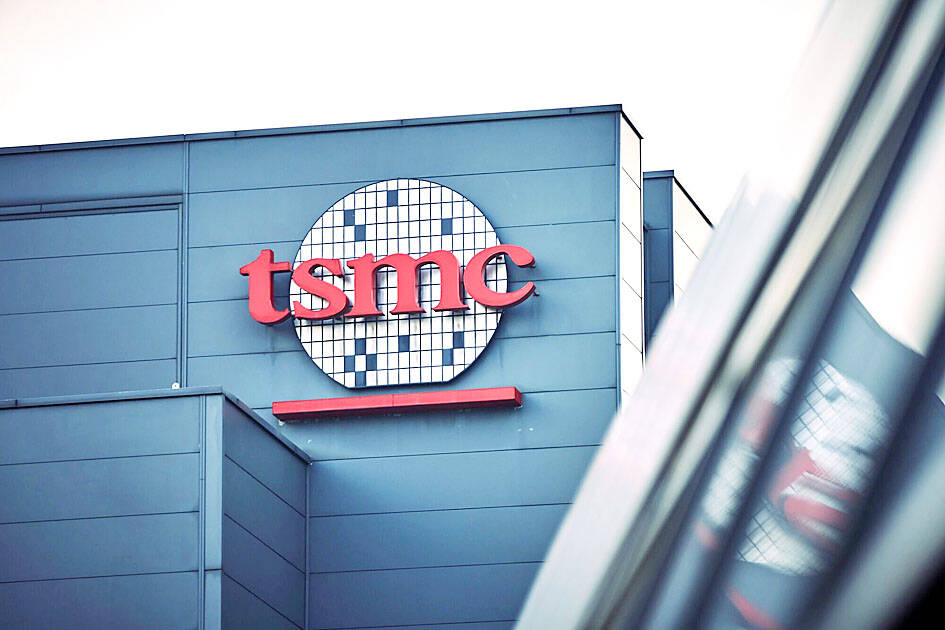Taiwan Semiconductor Manufacturing Co (TSMC, 台積電), the world’s largest contract chipmaker, became the world’s eighth biggest company in terms of market capitalization after a rally in its American depositary receipts (ADRs) on US markets on Monday.
TSMC’s ADRs rose 0.73 percent to close at NT$192.21, boosting the company’s market cap to US$996.8 billion, the eighth highest in the world, passing US-based investment firm Berkshire Hathaway Inc’s market value of US$992.4 billion. Berkshire Hathaway is owned by investment guru Warren Buffett.
TSMC’s ADRs hit an intraday high of US$194.25 on Monday in line with a robust showing by artificial intelligence (AI) chip designer Nvidia Corp, which rose 2.43 percent amid continued optimism toward AI development worldwide, dealers said.

Photo: An Rong Xu, Bloomberg
Yesterday, TSMC’s Taipei-lised shares rose 2.39 percent to close at NT$1,070, pushing up the benchmark TAIEX by 316.75 points, or 1.38 percent, to end at 23,292.04.
TSMC’s gains contributed about 200 points to the TAIEX’s rise and sent the electronics index and semiconductor sub-index higher by 1.89 percent and 2.09 percent, respectively.
“Many investors have embraced high hopes that TSMC will report good results for the third quarter and give impressive guidance for the fourth quarter and the whole of 2024 at an investor conference slated for Thursday, due to the AI boom,” Mega International Investment Services Corp (兆豐國際投顧) analyst Alex Huang (黃國偉) said. “It is possible TSMC will soon test NT$1,080, a closing high seen on July 11.”
“After the TAIEX passed 23,000 points, I expect the main board to soon challenge the historical intraday high of 23,650 points seen on July 17 as TSMC keeps moving ahead,” Huang said. “However, investors should remain alert over possible volatility on Wednesday, when October futures contracts will be settled, as foreign institutional investors still own a large amount of short position contracts.”
Turnover totaled NT$410.35 billion (US$12.75 billion) yesterday on the main board, with foreign institutional investors buying a net NT$33.43 billion of shares, Taiwan Stock Exchange data showed.

Vincent Wei led fellow Singaporean farmers around an empty Malaysian plot, laying out plans for a greenhouse and rows of leafy vegetables. What he pitched was not just space for crops, but a lifeline for growers struggling to make ends meet in a city-state with high prices and little vacant land. The future agriculture hub is part of a joint special economic zone launched last year by the two neighbors, expected to cost US$123 million and produce 10,000 tonnes of fresh produce annually. It is attracting Singaporean farmers with promises of cheaper land, labor and energy just over the border.

US actor Matthew McConaughey has filed recordings of his image and voice with US patent authorities to protect them from unauthorized usage by artificial intelligence (AI) platforms, a representative said earlier this week. Several video clips and audio recordings were registered by the commercial arm of the Just Keep Livin’ Foundation, a non-profit created by the Oscar-winning actor and his wife, Camila, according to the US Patent and Trademark Office database. Many artists are increasingly concerned about the uncontrolled use of their image via generative AI since the rollout of ChatGPT and other AI-powered tools. Several US states have adopted

A proposed billionaires’ tax in California has ignited a political uproar in Silicon Valley, with tech titans threatening to leave the state while California Governor Gavin Newsom of the Democratic Party maneuvers to defeat a levy that he fears would lead to an exodus of wealth. A technology mecca, California has more billionaires than any other US state — a few hundred, by some estimates. About half its personal income tax revenue, a financial backbone in the nearly US$350 billion budget, comes from the top 1 percent of earners. A large healthcare union is attempting to place a proposal before

KEEPING UP: The acquisition of a cleanroom in Taiwan would enable Micron to increase production in a market where demand continues to outpace supply, a Micron official said Micron Technology Inc has signed a letter of intent to buy a fabrication site in Taiwan from Powerchip Semiconductor Manufacturing Corp (力積電) for US$1.8 billion to expand its production of memory chips. Micron would take control of the P5 site in Miaoli County’s Tongluo Township (銅鑼) and plans to ramp up DRAM production in phases after the transaction closes in the second quarter, the company said in a statement on Saturday. The acquisition includes an existing 12 inch fab cleanroom of 27,871m2 and would further position Micron to address growing global demand for memory solutions, the company said. Micron expects the transaction to